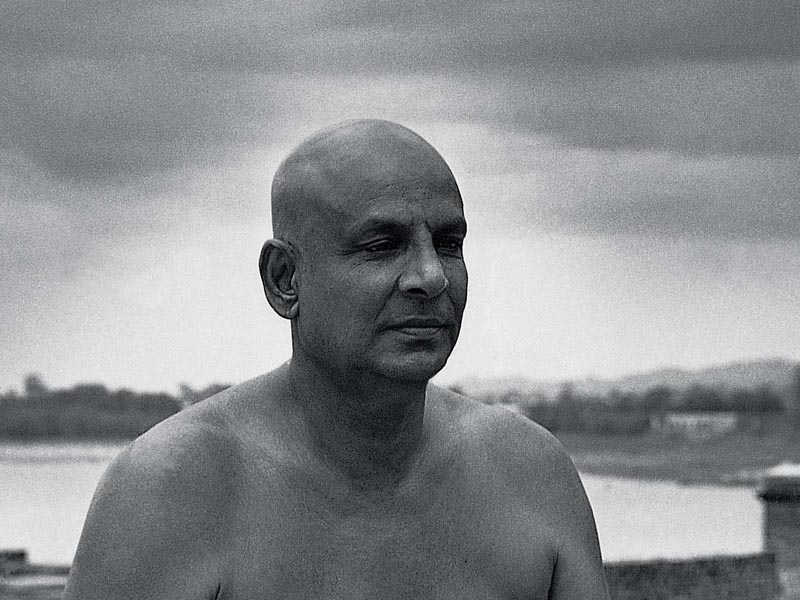Loving adorations to revered and beloved Holy Master Gurudev Sri Swami Sivanandaji Maharaj who was a sage established in the great Reality—a state which did not come easily to him. It came by dint of great effort, great austerity, great penance, great sadhana, great yoga, deep meditation, but at the same time, with a deep devotion to God, with a deep spirit of absolute surrender to Him: “I may put forth whatever efforts, but the efforts ultimately giving fruit in the attainment of the goal depend entirely upon the divine will of the omnipotent Lord. So in the ultimate analysis, my efforts are as nothing. One hundred per cent, totally, my attainments depend upon the divine will of the Supreme Being.”
So, his was a marvellous combination of the most earnest, most intense self-effort combined with a clear knowledge that everything is only in the hands of God. Human effort avails nothing; ultimately it is the divine will that prevails. And this attitude of his he kept as his own personal secret, his personal inner state always; because if he said, “Everything is in the hands of God,” we who are half-baked people, only too ready to take the easy way, will become lethargic: “No, no. He will do everything. We need not do anything.”
Because the subtle inner truth of lofty spiritual truths is not easy to understand, not easy to grasp. So he always used to say, “No, no, no. Self-effort. Always you must do effort. Without effort, nothing will come!” knowing full well the real, ultimate spiritual truth.
Gurudev Swami Sivanandaji’s one goal was world welfare. All should awaken from the slumber of ignorance. All should awaken and partake of the bliss of attaining Brahma jnana, for the slumber of ignorance is the cause of untold sorrow.
Swami Sivanandaji was a great karma yogin. In our times, he was one of the greatest, selfless workers for the welfare of all humanity. He did unique, unparalleled, unprecedented work. He wrote 300 books and had a big ashram. He held innumerable conferences and opened branches of The Divine Life Society all over India and throughout the world. We saw his activity.
However, we also know that he was a sankirtan samrat. He rejoiced in singing and chanting and dancing to the name of God. He wrote a book Japa Yoga. He was a great bhakta, a great devotee. He was an adorer of the Supreme Divinity in and through everything that he did. He literally lived, moved, had his being in God and acted, in even his minutest actions, only to adore that Supreme Being. For him life was one great worship. Even seeing, hearing, talking, breathing, smelling, touching, tasting, sitting, lying, walking—all things—constituted for him a supreme, glorious worship of the Divine.
Before we knew him, when he lived a life of seclusion, intense penance and sadhana in Swarg Ashram, he was known as a great meditator, a silent withdrawn person, always reflecting upon God, always inside the closed doors of his kutir meditating, meditating, meditating. He wrote a book Concentration and Meditation. He wrote a book Dhyana Yoga. He said that meditation is the ultimate key to attain illumination, enlightenment. He encouraged all his followers to meditate. He devoted a whole volume to translating, explaining and commenting upon the yoga of meditation as expounded in the Yoga Sutras of Maharshi Patanjali. He was a mystic meditator.
But at the same time, he was a kaivalya advaita vedantin in the line of Jagadguru Adi Shankaracharya. People in the vedantic ashrams in and around Rishikesh and Haridwar viewed him as a towering vedantic figure. He was all; but basically he was a yogi who sought union with the divine—and he found it. Then he proclaimed it to all as the goal of life and showed all the various ways and means of attaining that union.
Along with other important teachings, Gurudev taught us the essential unity of all religions—in spite of the outer differences in ceremonials, rituals, the architectural structure of the place of worship and the apparel worn by the priests belonging to each religion. All these may be different, but nonetheless they cannot affect the underlying, essential oneness in all religions. All religions declare the omnipresence, omnipotence, omniscience of the Supreme Being, the all-perfection of the Supreme Being.
Gurudev engaged himself in multifarious activities each day when he came out of his kutir to the office. He met visitors, entertained them, freely gave them spiritual literature, gave a patient hearing to their troubles, solved their problems, and if they were in distress, gave them solace. Like a great-grandfather, he did all these things. Yet we saw that he was constantly immersed in the Cosmic Being. He was constantly and continuously living in the Divine, in the Spiritual. He was a dual-dimensional marvel of our contemporary times.
The importance of this is that he proved that such a thing is possible—even in this Kali Yuga where humanity is experiencing a state of degradation. Even during his unprecedented, inspiring and nation-shaking spiritual tour of India in 1950, we observed that in spite of the hectic programs, he always abided in Brahman, in the Cosmic Reality.
The outward personality of Swami Sivananda functioned on the secular dimension. The inner reality which had realised itself as one with Brahman and became established in Brahmic-consciousness—That alone is real, all appearances are false—that inner state never varied, was never affected by anything outside. Therefore his consciousness, his personality was truly a marvel of the modern age.
Swami Sivananda’s reliance upon the Supreme was worth seeing. It was total, absolute. He was an object lesson to us. May his blessings be upon us all!




